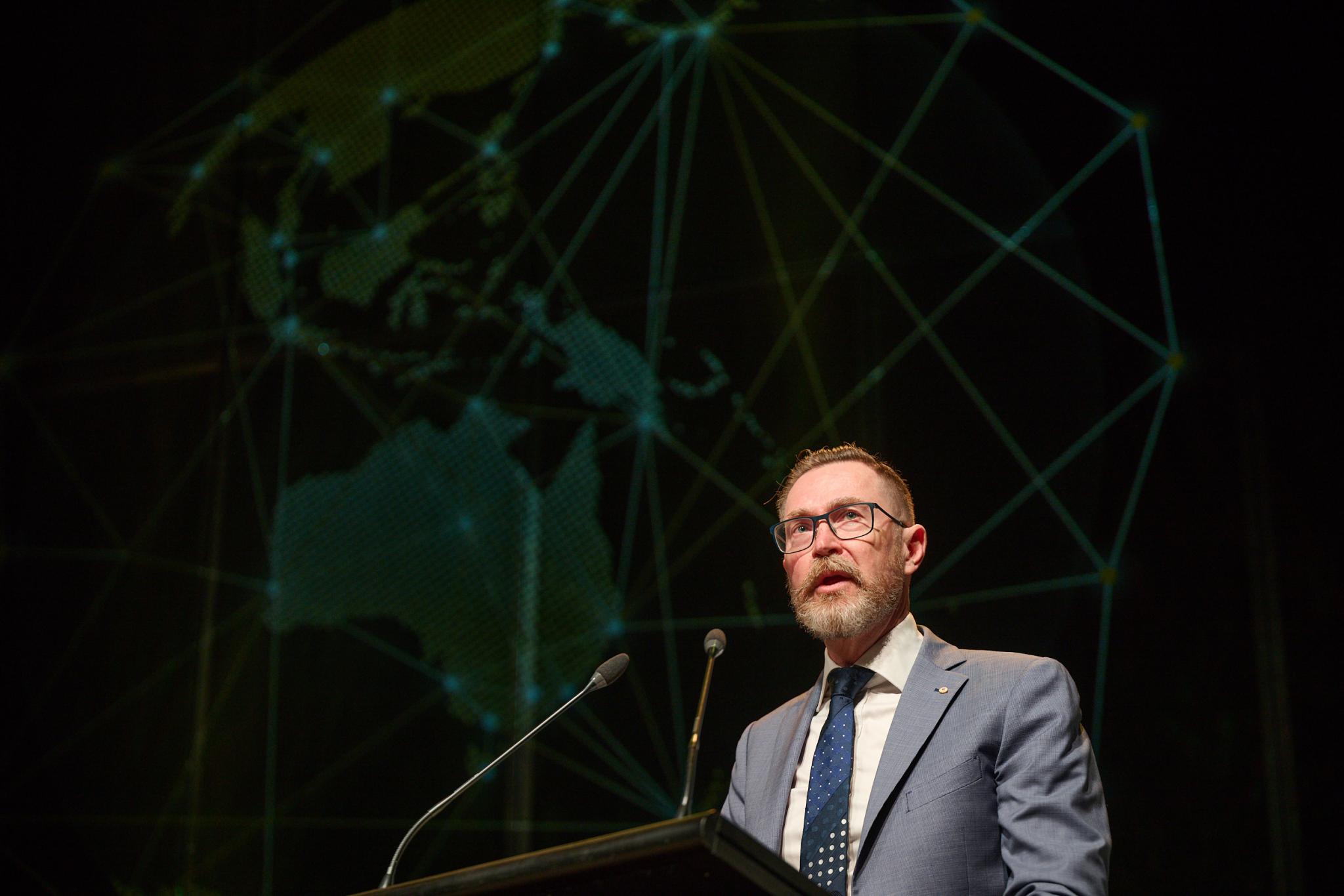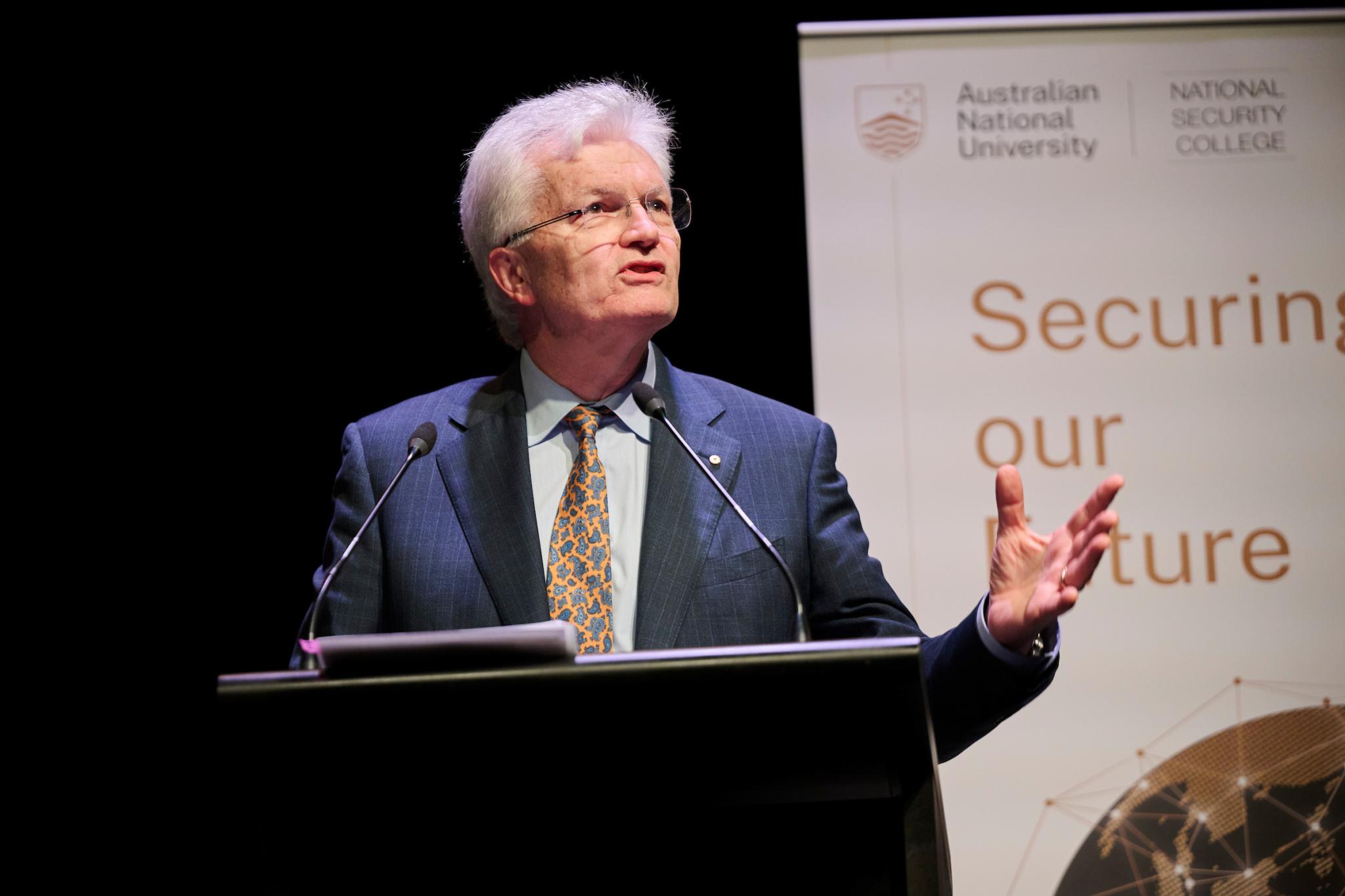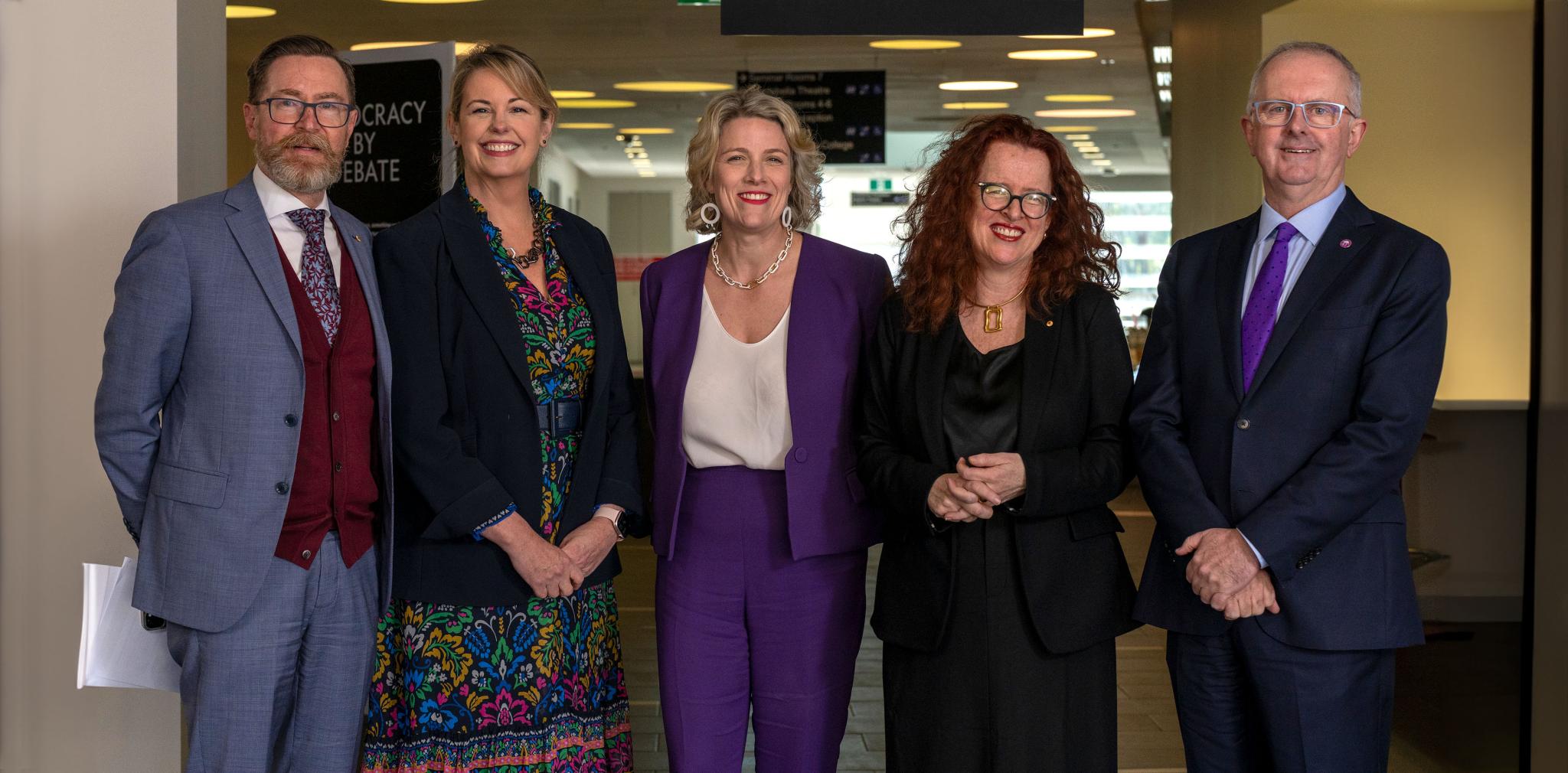Watch the entire speech by Minister O'Neil.
Speech: Clare O’Neil on the challenges to our democracy

The Hon Clare O’Neil MP, Minister for Home Affairs and Minister for Cyber Security
Australian National University, Canberra
Wednesday, 25 June 2024
Introduction
I acknowledge the Ngunnawal and Ngambri people who have been the traditional owners of the land around Canberra for 50,000 years.
I’d like to thank the Australian Electoral Commission, the International Institute for Democracy and Electoral Assistance, and the Australian National University’s National Security College, for hosting us here today.
Democracy matters
I’m a politician, so I love elections.
I know many Australians don’t share my sense of excitement.
But to me, I think to most of us here, it borders on heavenly to see citizens from around our country thinking and talking about the issues that matter to them.
Holding their politicians to account.
Making real choices about their country’s future, and the people who will help navigate it.
And doing so peacefully, at the ballot box.
Election days are extra special too, in my neck of the woods.
I represent one of the most multicultural communities in Australia.
The streets of my electorate pulse with the energy of citizens born in a hundred odd countries around the world.
Thousands of people I represent come from countries where fascism, nepotism, corruption, violence, and oppression are part of the everyday experience of government.
So for many people I represent, they don’t resent going to vote.
Each election day, I get to meet new citizens who are voting for the first time in their lives.
Usually, they cannot wipe the smile off their faces.
Some will bring their entire family, and dress beautifully, to celebrate something they see as a privilege.
They know what it means not to have the choices most Australians take for granted.
And now, they live in one of the most successful democracy in the world.
They know better than you, and me, that democracy isn’t an inevitability. It is not a natural state of order.
The simple act of getting to vote for your leaders is something enjoyed by fewer than half the people in the world. That share is in decline.
And for those of us who live in a full democracy, like Australia, we’re really lucky. It’s something shared by just 8% of the world’s population.
The quality of Australia’s democracy
Australia’s democracy is special.
Australia is the sixth oldest democracy in the world.
And in so many ways, we are the most successful, and the most pioneering.
We were pioneers in giving women the right to vote—and the very first to extend the right for women to stand in parliament.
We are amongst a fairly small number with compulsory voting. We are pioneers in the secret ballot, and in preferential voting.
And, we are pioneers because South Australia was the first place in the world to have a permanent, independent electoral commission.
And from that pioneering move, we have created one of the world’s finest, non-partisan, professionalised electoral administrations, devoid of political interference, which we see today exemplified in the modern AEC.
We have made mistakes, and we have made changes to correct them - notably, the early and prolonged disenfranchisement of First Nations people.
Our democracy lives and breathes.
Our democracy matters.
It is precious.
It is something that every Australian should be proud of.
The challenges to our democracy
When I look to the decades ahead, I can see a lot of challenges on the horizon.
I have said before, if I could be any country in the world looking into what the decades ahead hold—whether it is climate change, geopolitical tensions or other challenges—I would pick Australia every day of the week.
But the decades ahead are going to be more precarious. These are the most difficult geostrategic circumstances our country has faced since the end of the Second World War.
The choices we make will carry heavier consequences. And I think we can afford to make fewer errors than in the past.
Our best asset going into this difficult period is the quality and tone of our democracy.
Today I want to talk about two key challenges to our democracy. The first is the immense damage social media is having on our political system.
And the second is related—about our country’s social cohesion, and how tears in our social fabric are starting to normalise fundamentally anti-democratic behaviour.
Challenge 1: Social Media
Social media became popular in an age of technological utopianism. At worst, it was viewed as something fairly innocuous - a way to check up on friends from high school.
And at best, a profound new way for communities to organise, to link together and foster meaningful connections.
What it’s done instead is drive polarisation, and the binary entrenchment of views and values so present in politics today.
Misinformation has always been a part of democratic life.
But not like today.
Social media allows misinformation to spread at a speed, scale and intensity that we have never seen before.
And there is plenty of evidence that lies spread faster, and further, than the truth.
Democracy has always been at its heart about the constructive contest of ideas.
That doesn’t happen in social media echo chambers, which are designed not to challenge and grow your perspective, but to affirm and narrow.
Social media has degraded our democracy and divided us at a time when we need to be united.
It’s no chance that the recent rise of populism across the world has correlated with the introduction of social media.
What’s worrying is that the damage we have seen so far is probably the tip of the iceberg and there’s no indication of things changing.
Generative AI technology promises unprecedented productivity and scientific breakthroughs.
It also threatens, via social media, the proliferation of more voluminous, more targeted, and more believable harmful content.
Social media is also increasingly a crucial vehicle by which the principal security concern facing Australia, foreign interference, is being conducted.
Social media platforms enable malign actors to gather intelligence about us so we can be targeted.
Those same actors can then also use social media platforms to promote malicious narratives to undermine our trust in our leaders, institutions and fellow Australians.
These social media companies and digital platforms, they are not an organic development, a natural outgrowth of our public discourse.
These are products and platforms—developed and operated by private companies—that have in essence, sacrificed the health of our democracy at the altar of profit.
By impeding our access to the truth. By polluting our society with harmful content. By assisting foreign agents to interfere with our democracy and by weaponising our baser instincts, social media is a genuine and growing threat to our democracy.
Challenge 2: Social Cohesion
The second challenge I want to speak to you about is the deterioration in Australia’s social cohesion.
And of course, these two problems are connected.
Now, in my electorate, we know a thing or two about social cohesion. Living in and representing a very diverse place, we think a lot about, and tend to, what we share.
If you are looking for success stories of incredible social cohesion in Australia—there are dozens in every suburban street and hundreds in every suburban school dotted around my electorate.
This sort of social cohesion is central to the Australian way of life. It underpins our wellbeing, our trust in others, and our confidence in public institutions.
The more connected Australians feel to their own citizenship, to their own country, and to each other, the safer we will be, and the better our democracy will be.
But across Australia, our sense of connection and unity is in decline.
A key indicator has been the increase in Australians reporting experiences of prejudice based on their ethnicity, religion and migrant status in recent years.
That trend has been intensified in light of the events in Israel and Gaza.
Antisemitism and Islamophobia are far bigger problems than most Australians realise.
Right now, discrimination is a pervasive part of the life experience for both our Jewish and Muslim Australians.
The Executive Council of Australian Jewry noted a 41.9% increase in anti-Semitic incidents in Australia between 1 October 2022 and 30 September 2023 and a 738% spike between 7 October and December 2023.
According to the Islamophobia Register Australia, there was a 13 fold increase in islamophobic attacks in just the seven weeks following October 7.
The filter bubbles and echo chambers of social media, powered by opaque algorithms, germinate and grow this bigotry.
They are not just straining the social fabric of our country. They are ripping at it, continuously, aggressively.
I have spent a lot of time with my local Muslim community speaking about their long experiences with discrimination.
They are awful.
For Anglo-Australians, most of us cannot imagine being spat on a train, or yelled at for our religion in public. It happens, not infrequently, to women wearing hijabs.
And the experience of our Jewish Australian citizens is for many today one of palpable and genuine fear.
It is hard to believe that in our country today we have citizens who feel genuinely scared when they drop their children off at childcare every day.
There are very strong beliefs about the conflict in the Middle East.
And I support peoples’ right to express their views about it.
The right to protest is a basic right of any Australian, but when we see protests that engage in violence, which alienate vulnerable members of our society from services and representation, we have to push back.
Protest cannot be a blank cheque for behaviour which threatens the cohesion of our society.
It is important for us all to understand what is at stake here.
It is nothing less than the social fabric of our community, and the success and future of one of the strongest and oldest democracies in the world.
What lies at the heart of these two critical things – our community, and our democracy – is mutual respect, and civility.
Once lost, these things are hard to regain.
Every time our community engages in conflict of any sort, we set norms and standards for public debate. Norms and standards for what we do.
For the words we use.
For what we accuse each other of.
These norms and standards really matter.
These norms and standards are not laws, they are not requirements or regulations.
They are part of our shared political culture. Unstated understandings between citizens of how we manage disagreement.
Usually, in Australia, we play out those differences in a way that respects the safety and right of other people to hold a different opinion.
I see it every day in my work as a Member of Parliament.
And perhaps most importantly of all, we share a national view that those differences are resolved peacefully, at the ballot box.
Peaceful protest is a right in a democracy. I will support it until the day I die.
But preventing vulnerable people from accessing government services is not respectful of our fellow citizens. Jamming open the door of the offices of politicians and screaming until the staff have to leave, shaking, is not peaceful protest.
Painting blood red symbols of terrorism, or leaving child-like fake bodies outside offices, is not properly peaceful protest.
It is menacing, it is violent, and it is unacceptable.
We need to remember that the choices we make about how we prosecute our beliefs—they are setting new norms and standards, not just for those who share our views, but also for those who don’t.
And one day, the shoe will be on the other foot.
I represent a part of the world where many of my constituents know what it looks like when differences aren’t resolved at the ballot box. But through violence and civil unrest.
Many people in my community left their country or origin to escape such a culture.
That’s what we are playing with here.
And it’s incredibly serious.
That is why now, more than ever, we must as a nation, not just as a government, take commensurate action to protect our democracy.
What the government is doing
The government is, of course, doing a great deal to tackle these issues and more broadly defend our democracy.
There is of course the work of the Electoral Integrity Assurance Taskforce, led by the AEC.
Most Australians would not know much about the world of this Taskforce. But it matters a great deal. This group is increasingly being called on to safeguard the integrity of our electoral events from threats, including foreign interference and disinformation pervaded through social media.
The Minister for Communications Michelle Rowland is legislating powers for the Australian Communications and Media Authority to enable them to hold digital platforms to account for their role in the spread of mis- and disinformation.
And Ministers Rowland and Jones have led work to establish a Joint Select Committee to make social media companies more accountable and transparent.
Our Attorney-General will be bringing forward legislation to create new criminal offences and strengthen existing laws against hate speech. This in addition to the laws passed by the parliament in December 2023 criminalising the Nazi salute and the public display of and trade in Nazi and terrorist hate symbols.
Strengthening democracy report
So inside home affairs, when we were elected to government, we set up a new unit called the strengthening democracy and social cohesion Task Force.
And this is really focused on a very important question, which is, I've said before the issues facing our democracy in some respects and much admired problems, there's a lot of articles, you know, probably into the millions of pages of ways in which we describe what's going wrong with democracy around the world, not as much focus on the solutions.
Jenny Han and her team have been doing a huge amount of work, thinking about what practical concrete steps we can engage with to get active participation, and build those ingredients to successful democracy that we know are really important.
I'll be watching Jenny's work a little bit later this year. I'm really excited about the work that's been done.
Something else that the department's very focused on is some of the social cohesion issues that I talked about before. We've done a lot around grant announcements and about supporting communities who are in genuinely very deep distress about what's going on in the Middle East at the moment, and the work that's been done there is really, really important as well.
Conclusion
Democracy is facing an increasingly challenging and global environment, particularly owing to the security challenges created by the digital information age.
But in the face of all this, I’m still genuinely optimistic.
I am confident about Australia’s future, because of what I see when I look back.
We are not a hugely successful democracy by accident. It was never inevitable.
It happened because of the long work and efforts of previous generations of the people in this room, and of our citizens.
Democracy thrives on active participation. We are honour bound to keep that up.
I spoke about things our government is doing to tackle some of these problems earlier.
But what I think we often forget as politicians is that often, what matters more than anything is what our leaders say and do.
And so the quality of leadership of our country is very important, in this moment.
What Australia needs right now is leaders whose natural instinct is to unite, not divide. And, in my very genuine view, that is what we have in our Prime Minister, Anthony Albanese.
We’ve all got big and important obligations here – to drive this conversation, and make sure that it creates real change for our country.


